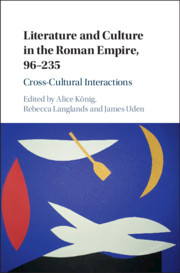Book contents
- Literature and Culture in the Roman Empire, 96–235
- Literature and Culture in the Roman Empire, 96–235
- Copyright page
- Contents
- Figures
- Contributors
- Preface
- Timeline
- Abbreviations
- Map
- Introduction
- Part I Refiguring Roman and Greek Interactions
- Chapter 1 Beyond Romans and Others
- Chapter 2 The Noise-Lovers
- Chapter 3 Plutarch and Roman Exemplary Ethics
- Chapter 4 Patronage, Cultural Difference and Literary Interactivity
- Chapter 5 The Romance of Republican History
- Chapter 6 Tactical Interactions
- Part II Imperial Infrastructure: Documents and Monuments
- Part III Cultural Translation and Transformation
- References
- Index
Chapter 3 - Plutarch and Roman Exemplary Ethics
Cultural Interactions
from Part I - Refiguring Roman and Greek Interactions
Published online by Cambridge University Press: 28 April 2020
- Literature and Culture in the Roman Empire, 96–235
- Literature and Culture in the Roman Empire, 96–235
- Copyright page
- Contents
- Figures
- Contributors
- Preface
- Timeline
- Abbreviations
- Map
- Introduction
- Part I Refiguring Roman and Greek Interactions
- Chapter 1 Beyond Romans and Others
- Chapter 2 The Noise-Lovers
- Chapter 3 Plutarch and Roman Exemplary Ethics
- Chapter 4 Patronage, Cultural Difference and Literary Interactivity
- Chapter 5 The Romance of Republican History
- Chapter 6 Tactical Interactions
- Part II Imperial Infrastructure: Documents and Monuments
- Part III Cultural Translation and Transformation
- References
- Index
Summary
This chapter argues that Plutarch’s moralising works (especially the Progress in Virtue and Parallel Lives) show signs of having been significantly influenced by Roman exemplary ethics. Plutarch brings Roman ideas about exemplary ethics and imitation to bear on the Greek philosophical tradition, and his critique of Platonic mimesis is emboldened by the critical Roman framework which he must have encountered as a lived Roman tradition, not just in the Latin literature that he may have read as a source for his Roman lives and other writings, but also in day-to-day experiences with his Roman friends, such as Sosius Senecio, to whom he dedicates both Progress in Virtue and the Parallel Lives.
- Type
- Chapter
- Information
- Literature and Culture in the Roman Empire, 96–235Cross-Cultural Interactions, pp. 75 - 94Publisher: Cambridge University PressPrint publication year: 2020
- 14
- Cited by

